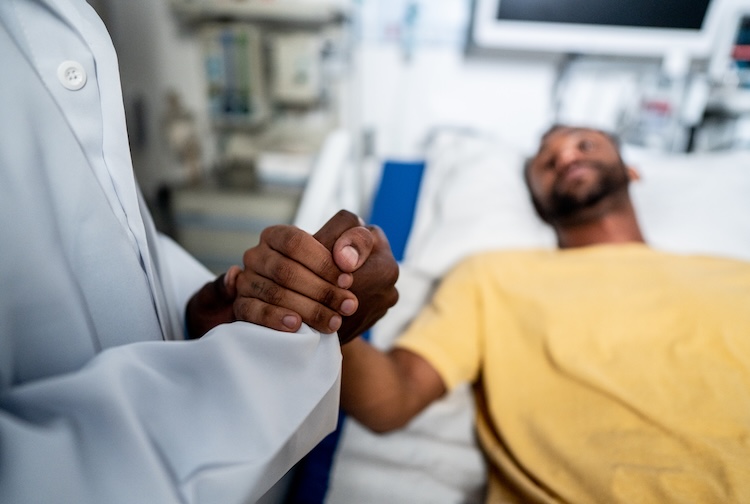
End of anti-rejection transplant drugs? A clinical trial at Hume-Lee hopes so.
April 27, 2022 Photo: Getty Images
Photo: Getty Images
By Jeff Kelley
It’s literally a fact of life: Transplant recipients must take anti-rejection drugs their entire life in order for their bodies to accept and keep a donated organ. But while these medications help patients live long and healthy lives after transplant, these same medications are also responsible for long-term complications, such as cancers, infections and heart disease.
“It’s very much a double-edged sword,” said Shawn Fenner, a clinical research coordinator at VCU Health Hume-Lee Transplant Center.
Downside of immunosuppressants begs for new approaches
The downside of immunosuppressant medication led Hume-Lee to the FREEDOM-1 study, which is investigating a stem cell therapy called FCR001. The study seeks to determine whether FCR001 can prevent rejection of living donor kidney transplants without the need for lifelong anti-rejection drugs.
A Phase 3 clinical trial, FREEDOM-1 will compare the efficacy and safety of FCR001 treatment to standard anti-rejection treatment. The goal? Get recipients off anti-rejection drugs in one year.
“If FCR001 were to work, transplant recipients could live like a normal person, without fear of organ rejection or harmful complications,” said Dr. Gaurav Gupta, Hume-Lee’s medical director of kidney transplantation.
What is FCR001 cell therapy?
FCR001 is an investigational cell therapy that uses stem cells obtained from the living kidney donor. These cells are processed and infused into the kidney recipient. The cells then take up residence in the recipient’s bone marrow and generate new immune cells.
The goal is to create a “dual immune system” (part-donor and part-recipient) in the transplant recipient. Researchers expect the two immune systems to coexist, recognizing both the recipient’s own body as well as the donated organ as “self.”
If successful, the treatment will enable long-term immune tolerance of the donor organ. Ultimately, this would allow the transplant recipient to live free of the daily pill burden typically required to suppress the immune system and prevent organ rejection. It would also free the transplant recipient of the many complications associated with chronic anti-rejection therapy.
Hume-Lee is one of only 15 transplant centers nationwide participating in the FREEDOM-1 study. The study is open to living kidney donors meeting certain criteria and their intended recipient.
Trial uses established science
The clinical trial sponsor, Talaris Therapeutics, began studying the science behind FCR001 in 1990. The company’s initial FCR001 studies have been promising: In a Phase 2 clinical trial of 37 adults who received a living-donor kidney, 26 were able to completely discontinue their immunosuppressant drugs.
In 2010, the first FCR001-dosed patient was weaned off all immunosuppressant drugs and remains free of the medications. Another patient who had been off immunosuppression for five years gave birth to a healthy girl in 2018. The foundation of the therapy, human stem cells, have long shown success in patients with sickle-cell disease and blood cancers.
“We’re not reinventing the wheel — we’re adding solid organs to the list of potential for what stem cells can do,” Gupta said. “It is truly incredible science. This is the first step to bring it to many more patients than those participating in the clinical trial.”
Hume-Lee motto: Never rest at good enough
Fenner pointed out that the FREEDOM-1 study exemplifies Hume-Lee’s approach to transplantation: Never rest at “good enough.” “If we see something as a better way, we’re going to see if it works — and the way we do that is through clinical trials.”
If the FREEDOM-1 study is successful, it could be the last step before approval by the Food and Drug Administration. At that point, the therapy could be made available to a wider set of patients.
“I look at things like this therapy as a potential game changer,” Fenner said. “To be able to come to work every day to work on things like this is a tremendous honor.
Are you eligible for the FREEDOM-1 study?
Review these eligibility requirements or contact Shawn Fenner at VCU Health Hume-Lee Transplant Center to see if you qualify.
Sign Up for Transplant E-Newsletter



